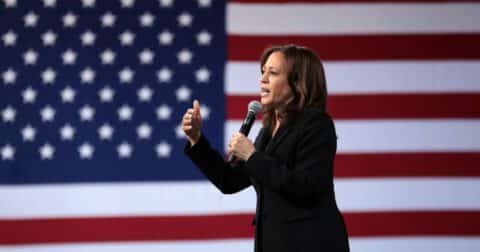News
Republicans’ New Farm Bill Takes Aim at Animal Welfare and Pesticide Regulations
Policy•8 min read
Explainer
A brief look into the Democratic presidential candidate’s history and personal habits.


Words by Seth Millstein
Since becoming the Democratic nominee for president, Vice President Kamala Harris has said little-to-nothing about her views on agriculture policy. Agriculture admittedly isn’t the flashiest of political topics — but it’s still an extremely important one that shapes millions of lives, human and animal alike. So, where exactly does Harris stand on agriculture, meat and factory farming?
Harris has had a long career. Prior to becoming vice president, she was a U.S. Senator, Attorney General of California and District Attorney of San Francisco. While a politician’s past isn’t always a perfect indicator of what they’ll do in the future, looking at her positions on agricultural matters could offer some hints as to where she stands on factory farming, meat and other agricultural issues.
There are many ways a president can affect change in America’s food and agricultural policies.
In addition to signing or vetoing bills, the president can issue executive orders, appoint agency heads, issue agency directives and implement or suspend certain regulations. They can use the bully pulpit to try and shift public opinion, and if their party controls Congress, they can be very influential in determining which legislation lands on their desk.
“If Congress knows that a president’s priority is to work on a climate bill that includes certain values around climate smart agriculture, for example, or the prioritization of more climate-friendly diets and a shift towards plant-based eating, that’s much more likely to get pushed through,” Andrew deCoriolis, executive director of the nonprofit Farm Forward, tells Sentient. Farm Forward advocates for the end of factory farming, including in food policy.
Federal regulations are another area in which the president has significant latitude to affect food policy. For instance, under President Obama, the U.S. Department of Agriculture announced new standards for organic livestock. Under the new rules, livestock farmers would have to adhere to higher (and specifically enumerated) standards of animal welfare in order for their products to be certified as organic by the federal government.
But these new organic regulations weren’t scheduled to be implemented until after Obama left office. When Donald Trump assumed the presidency, he reversed course and had the USDA withdraw the new organic regulations before they could take effect, upsetting many animal welfare activists. Three years later, when Joe Biden became president, the USDA re-issued the Obama-era standards, and they now have the force of law.
Were she to become president, Harris would have these and many other tools at her disposal. But how would she use them? There’s no way to say for sure, but looking at the positions Harris has taken on agricultural and meat-related issues in the past might give us some clues.
Foie gras is a meat dish that’s made by force-feeding a duck or goose until its liver is engorged beyond its natural size. The animal is then killed and the bloated liver is served as a delicacy. This stomach-churning process has made foie gras controversial even among meat eaters, and in 2004, California banned the sale or production of it in the state.
This kicked off a 15-year court battle between foie gras producers and animal welfare groups, with the law repeatedly being struck down, reinstated, appealed, and so on.
In 2015, a U.S. District Court judge ruled that the ban was illegal. At this point, Harris was the Attorney General of California, and she appealed the ruling in an attempt to get the foie gras ban reinstated. She was successful, and after more back-and-forths, the Supreme Court allowed the foie gras ban to stand.
On factory farms, many egg-laying hens live their lives in battery cages — small, cramped wire enclosures that severely restrict the chickens’ mobility. Hens in battery cages have just 67 square inches of space, or less than the surface area of an 8.5 by 11 sheet of paper, and are frequently subject to harsh light 18 hours a day in order to manipulate their reproductive systems and increase egg output.
In 2008, California voters approved Proposition 2, which banned the use of battery cages in the state. Two years later, the state’s legislature expanded upon Proposition 2, and banned the in-state sale of eggs that were produced using battery cages in other states, which totally phased out battery cages by 2015.
The attorneys general of six major egg-producing states sued California to overturn the law. As with the foie gras ban, Harris’s office defended the battery cage ban, and it was ultimately allowed to stand, with the judge determining that the ban would not inflict any harm upon the residents of the other states (or any state).
In 2016, Harris was elected to the U.S. Senate, and we can glean a few things about her stance on animal welfare by looking at her voting record during her time in Congress.
Over the course of her four years in the Senate, Harris co-sponsored many animal welfare initiatives, including bills to ban the possession and trade of shark fins, crack down on the painful practice of horse soring, prohibit the private ownership and sale of primates and more.
For these reasons and others, the Humane Society Legislative Fund gave Harris a perfect grade during her years in the Senate on its “Humane Scorecard,” the organization’s system for ranking elected officials’ actions on animal welfare.
Harris was elected vice president in 2020. Two years earlier, however, California voters approved Proposition 12, a landmark ballot initiative that banned extreme confinement of livestock, and also banned the sale of animal products that were produced using extreme confinement in other states.
Not surprisingly, Proposition 12 was extremely unpopular with meat producers, and two industry groups — the National Pork Producers Council and the American Farm Bureau Federation — sued to overturn it. The Supreme Court ultimately upheld Proposition 12, and it’s now law in California, though the Council recently held a fly-in event in Washington, D.C. for pork farmers to lobby federal lawmakers for a “legislative fix” to Proposition 12.
Before that ruling, however, the Biden administration weighed in on the issue, and sided with the meat producers. The Solicitor General filed a brief with the Supreme Court arguing that Prop 12 should be blocked, writing that “voters in pork-producing States must determine what constitutes ‘cruel’ treatment of animals housed in those States, not voters in California.”
This was ultimately inconsequential, as the court upheld the law. At the time, however, the administration’s stance angered not only animal rights groups, but also over a dozen Democratic senators who’d signed a letter urging the administration to support the law.
As vice president, Harris was a member of the administration when it advocated against Prop 12 — though she didn’t express any position on the proposition itself, or the Biden administration’s actions against it.
It’s worth noting here that the vice president has no control over what the Solicitor General’s office does, and that the actions of a presidential administration on any given issue aren’t always an indicator of how the sitting vice president feels about that issue.
This doesn’t mean that Harris secretly supports Prop 12. It does mean, though, that she doesn’t necessarily oppose it. Sentient has reached out to the Harris campaign for clarification on her position on Prop 12, but has received no comment at the time of publication.
Recently, some conservatives have erroneously claimed that Harris supports banning red meat. Republican Senator and vice presidential nominee J.D. Vance said in July that Harris wants to “take away your ability to eat red meat,” and his assertion was quickly parrotted by several right-wing conspiracy websites.
This is categorically false, however. Harris has never voiced support for banning any meat, red or otherwise. She has suggested that the Dietary Guidelines for Americans (DGA), a nutritional guidance document that the USDA updates every five years, should recommend that Americans reduce their red meat consumption. But that is nowhere near a “ban” on red meat.
In fact, at the very same event in which Harris suggested changing the DGA’s recommendations, she also said that she “love[s] cheeseburgers.” On the morning Biden announced that he was dropping out of the race, Harris was reportedly cooking bacon for her nieces.
That said, she has hinted at flexitarian tendencies, and a fondness for a vegan cereal with almond milk in the morning. According to an Instagram post by Tacotarian’s co-owner Kristen Corral, Harris reportedly said when visiting the restaurant that she’s dabbling in veganism before 6 p.m. (though this quote is unconfirmed, so it very well may not be what Harris actually said).
Taking a step back, the totality of Harris’s actions on food and meat policies paint the picture of somebody who cares about animal welfare, and is willing to implement more humane policies even if it means upsetting the meat industry. This is somewhat complicated by the Biden administration’s challenge to Proposition 12, which deCoriolis calls “very disappointing.” But again, this isn’t necessarily an indicator of Harris’s views.
One thing is clear: regardless of what approach Harris would take to any number of food-related questions, it would almost certainly be more progressive and climate-focused than with former President Trump.
“It’s too early to say, but my sense is that there’d be very stark differences between what a Harris and Walz administration might do [on these issues] compared to a second Trump administration, given what we know about the first Trump administration,” deCoriolis says.
Correction: This piece has been corrected to note that the Humane Society Legislative Fund, not the Humane Society, that issues “Humane Scorecards.”